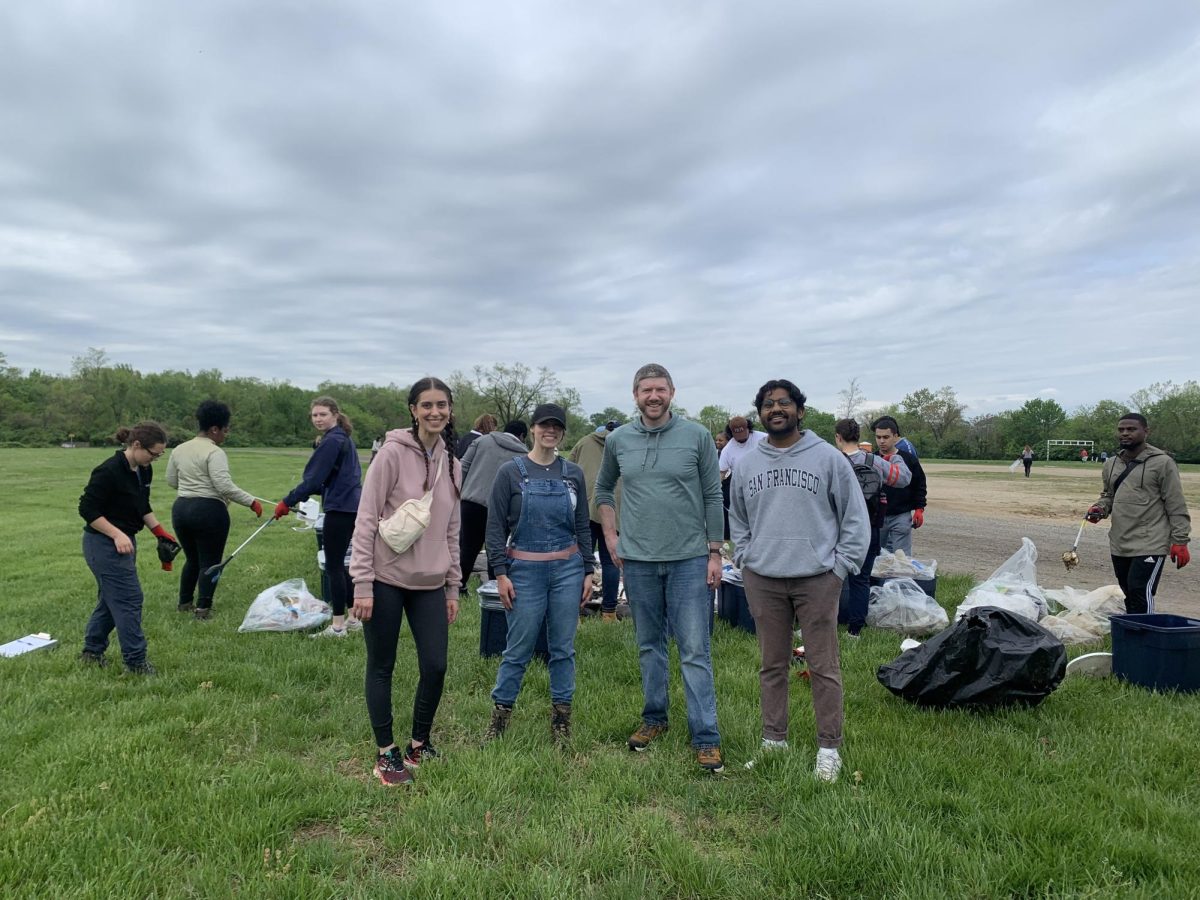
Henle Village chaplain-in-residence Andrew Staron enjoys an afternoon on campus with his 2-year-old son, A.J.
For most children, college is at most a vague, unfamiliar concept. But for the children of the faculty- and chaplains-in-residence at Georgetown, this college campus is a warm home.
About 13 children live in student housing on campus as part of the faculty-in-residence and chaplain-in-residence programs. For them, the university is not an institution of higher learning, but a place where they can explore, play and learn.
WORK HARD, PLAY HARD
Tad Howard, associate dean of Georgetown College, moved on campus with his wife, Susan, in 2007. Their son, Grady, now almost 3, was born at the Georgetown University Hospital and has known no other home than Kennedy Hall.
“I try to get in his imagination, and I think he believes that the whole campus is his yard. So we open up the front door and he’s looking at the football field, and there are people playing sports on his yard,” Howard said.
Students often see Howard and his son frequenting Grady’s favorite places, such as the fishpond next to the White-Gravenor or the fountain in the Dahlgren Quadrangle.
For Maya Roth, the director of theater and performance studies, the greatest benefit of living on campus is the proximity between her workplace and her home. She and her husband, Bill, raise their son, Yul, in LXR Hall. While Roth is at work, Yul spends his days at the nearby Hoya Kids Learning Center, a daycare and preschool facility for children of Georgetown students, faculty and staff.
“It’s just great to walk to work and take Yul to school and pick him up and have that kind of integrated path,” Roth said. “One of the things I love and I think my students love is that my worlds overlap a bit.”
KEEPING THE PEACE
While university neighbors may complain about rowdy undergraduates, and students may gripe about a lack of social space, parents on campus have few complaints.
While university dorms are not necessarily as spacious as private residences, Howard and his family have been very happy living in Kennedy Hall.
“We’re not exactly near a Babies-R-Us, but then that could be true if we lived in a neighborhood as well,” he said.
Andy Staron, chaplain-in-residence in Henle Village and a professor in the theology department, said he and his wife, Andrea, don’t usually find the noisy campus setting to be a challenge, even when putting their 2-year-old A.J. and 6-month-old Lucia to bed at an early hour.
“Students are pretty considerate when they’re sober,” Staron said. “No one wants to be the jerk who woke up the baby.”
Staron and Roth noted the lack of a typical neighborhood environment and readily available playmates as potential downsides to raising their children on campus.
“The one thing we’re lacking here is a neighborhood, you know, with kids down the street,” Staron said. “But especially over the last couple years, there has been an increase in kids [on campus], so now there are a good number of kids and it’s a lot of fun.”
BLOSSOMING RELATIONSHIPS
Howard estimates that there is an event for all of the children living on campus about once per semester that allows them to get together and interact with other families.
In October, chaplains-in-residence in Kennedy Hall organized a Halloween party in the Kennedy multi-purpose room, and about a dozen children attended in full costume.
Howard said Georgetown offers a unique sense of community for his family and credits Grady’s social nature to the many opportunities he has to interact with students and faculty on a daily basis.
He added that the ready supply of babysitters is convenient.
“Our friends who don’t live on campus are insanely jealous of that. And it’s wonderful, because it’s not just that they’re easy to find, but that we know who we’re getting and that [Grady will] be loved. We don’t have to worry. That is such a blessing,” Howard said.
For many parents, the importance of interactions between their children and the students they work with has been surprising.
“I didn’t anticipate how important Yul was going to be in my life as a faculty-in-residence,” Roth said. “There are certainly students whom I know he has navigated my relationship with. They might not seek me out if it weren’t for him, but he facilitates interaction.”
Ciara Foldenauer (COL ’14), a resident of Henle Village, enjoys seeing A.J. playing on his scooter and having the opportunity to interact with the Staron family.
“I think it really gives a lot to the college experience, and I think it’s one of the best aspects of residence life,” she said. “You know, when you’re on a college campus you don’t get to see many old people or children or families, so it’s really nice to have a family living close by.”
For Staron, having children on campus adds to the overall sense of community at Georgetown.
“I had an old buddy who said college campuses could stand to have more dogs and babies,” Staron said. “It humanizes the place a little bit.”














